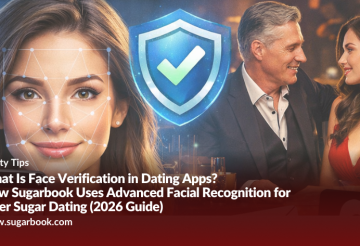In a world where dating apps have expanded our choices and traditional relationship models are evolving, more people are exploring relationship styles outside of monogamy. One term rising in popularity and practice is ethical non monogamy. But what exactly does it mean, and how does it work?
This article will guide you through the ins and outs of ethical non monogamy – what it means, how it’s practiced, the differences from infidelity or open relationships, and why it’s increasingly relevant in today’s dating culture. Whether you’re curious, exploring, or actively practicing ethical non monogamy, this comprehensive guide will help you understand the values and structure that support this relationship style.
Contents
- Ethical Non Monogamy Explained: What Does It Really Mean?
- Ethical Non Monogamy vs Polyamory: Are They the Same?
- Ethical Non Monogamy in Modern Dating Culture
- Types of Ethical Non Monogamy Relationships
- Ethical Non Monogamy and Communication: The Foundation of Trust
- Ethical Non Monogamy and Jealousy: Managing Emotions with Maturity
- Ethical Non Monogamy and Boundaries: Defining Agreements
- Ethical Non Monogamy and Inclusivity: Welcoming All Orientations and Genders
- Ethical Non Monogamy in Long-Term Relationships
- Ethical Non Monogamy Myths and Misconceptions
- Ethical Non Monogamy and Mental Health
- Should You Try Ethical Non Monogamy?
- Final Thoughts on Ethical Non Monogamy
Ethical Non Monogamy Explained: What Does It Really Mean?
Ethical non monogamy, often abbreviated as ENM, refers to any relationship style in which people openly and consensually engage in romantic or sexual relationships with more than one person. The “ethical” part is essential—it means that all involved parties are aware, consenting, and respectful of each other’s boundaries and needs.
Unlike cheating, which involves secrecy and betrayal, ethical non monogamy is grounded in transparency, trust, and communication. This approach challenges the one-size-fits-all model of love and acknowledges that multiple loving or intimate connections can coexist when handled with honesty.
At its core, ethical non monogamy prioritizes:
-
Informed consent
-
Open communication
-
Emotional responsibility
-
Respect for autonomy
Ethical non monogamy isn’t about being reckless or avoiding commitment—it’s about creating custom relationship structures that align with personal values and emotional truths.
Ethical Non Monogamy vs Polyamory: Are They the Same?
While often used interchangeably, ethical non monogamy is a broader umbrella under which polyamory falls. Ethical non monogamy includes many relationship types where more than one connection is formed, but not all are polyamorous.
Polyamory specifically refers to having multiple romantic relationships simultaneously with the knowledge and consent of everyone involved. Ethical non monogamy, however, could also include:
-
Open relationships
-
Swinging
-
Relationship anarchy
-
Solo polyamory
-
Hierarchical and non-hierarchical structures
So, while all polyamorous relationships are forms of ethical non monogamy, not all ethically non-monogamous relationships are polyamorous.
Ethical Non Monogamy in Modern Dating Culture
As traditional dating norms evolve, ethical non monogamy is becoming more visible and accepted. Dating apps like OkCupid, Feeld, and Tinder now allow users to identify as non-monogamous or ethically non-monogamous, helping people find like-minded partners.
The rise of ethical non monogamy in modern dating signals a shift toward personalization and honesty in relationships. For some, monogamy feels limiting or unnatural. Ethical non monogamy offers an alternative that emphasizes choice and autonomy, rather than conformity.
People choose ethical non monogamy for various reasons:
-
Desire for multiple emotional or sexual connections
-
Avoiding social pressure to settle down traditionally
-
Aligning with a philosophical belief in relationship freedom
-
Seeking new forms of intimacy or exploration
Regardless of the reason, ethical non monogamy opens space for more inclusive and diverse expressions of love.
Types of Ethical Non Monogamy Relationships
Understanding the variations of ethical non monogamy can help clarify what relationship styles may work best for you. Here are the most common types:
Polyamory
This form of ethical non monogamy involves having multiple romantic partners, often with emotional depth and commitment. These relationships can be hierarchical (e.g., primary, secondary) or non-hierarchical.
Open Relationships
Couples may remain emotionally monogamous but allow sexual experiences outside the partnership. This is one of the most recognizable forms of ethical non monogamy.
Swinging
Often practiced by couples, swinging involves engaging in consensual sexual activities with others, typically in social settings like parties or clubs.
Relationship Anarchy
A radical form of ethical non monogamy that rejects traditional labels and rules. Each connection is treated individually, without predefined expectations.
Solo Polyamory
Individuals who practice solo polyamory maintain multiple relationships but prioritize independence, often avoiding traditional nesting or cohabitation dynamics.
Each type of ethical non monogamy has its own set of norms, communication styles, and emotional complexities. What unites them all is the commitment to honesty and consent.
Ethical Non Monogamy and Communication: The Foundation of Trust
No ethical non monogamy relationship can succeed without effective communication. Because multiple people and feelings are involved, it’s essential to foster an open dialogue around boundaries, desires, and emotions.
Healthy communication in ethical non monogamy includes:
-
Sharing expectations clearly
-
Expressing jealousy constructively
-
Scheduling regular check-ins
-
Using nonviolent communication techniques
-
Acknowledging emotional labor and equity
Unlike monogamous relationships, where some expectations are socially assumed, ethical non monogamy demands that partners actively co-create agreements.
Many people new to ethical non monogamy are surprised at how much conversation is involved. But this intentional communication builds stronger, more resilient connections.

Meet successful sugar daddies and confident sugar babies on the world’s leading sugar dating app. Join free today.
Ethical Non Monogamy and Jealousy: Managing Emotions with Maturity
Jealousy often comes up in discussions of ethical non monogamy. Contrary to popular belief, practicing ethical non monogamy doesn’t mean you never feel jealousy, it means you’re committed to understanding and managing it.
Jealousy in ethical non monogamy can stem from:
-
Insecurity or fear of being replaced
-
Comparisons between partners
-
Unmet emotional needs
-
Lack of clarity or communication
Rather than suppressing these feelings, people in ethical non monogamy relationships are encouraged to explore their root causes and work through them collaboratively.
Strategies to manage jealousy include:
-
Practicing self-awareness
-
Seeking reassurance when needed
-
Developing secure attachment styles
-
Avoiding scarcity mindset
-
Reframing jealousy as an opportunity for growth
In ethical non monogamy, jealousy isn’t a deal-breaker—it’s an emotion to understand, not a reason to retreat.
Ethical Non Monogamy and Boundaries: Defining Agreements
Boundaries are a cornerstone of ethical non monogamy. Unlike monogamous relationships, which come with culturally prescribed boundaries, ethical non monogamy requires active negotiation.
Common boundaries in ethical non monogamy include:
-
Time management (scheduling dates)
-
Sexual health protocols (testing, condom use)
-
Emotional limits (how much is shared about other partners)
-
Living arrangements (cohabiting or solo living)
-
Disclosure rules (how much is shared and with whom)
These agreements are fluid and may evolve over time. The goal is to create safety and comfort while allowing space for growth and connection.
People practicing ethical non monogamy often find empowerment in customizing boundaries that suit their needs, rather than adopting default rules.
Ethical Non Monogamy and Inclusivity: Welcoming All Orientations and Genders
Ethical non monogamy is inherently inclusive. It challenges the traditional binary of relationships and opens doors for diverse sexual orientations, gender identities, and neurodiverse individuals to define love on their terms.
Many queer, trans, and nonbinary people find ethical non monogamy more flexible and affirming than conventional relationships. The model’s emphasis on communication and consent also makes it appealing for neurodiverse individuals who prefer structure and transparency.
Inclusivity in ethical non monogamy looks like:
-
Affirming diverse identities
-
Avoiding heteronormative relationship expectations
-
Practicing equity between all partners
-
Recognizing intersectional challenges (race, disability, class)
The open-ended nature of ethical non monogamy allows for more authentic self-expression and richer emotional landscapes.
Ethical Non Monogamy in Long-Term Relationships
One of the most common misconceptions is that ethical non monogamy is a phase or something only for young singles. In reality, many long-term couples practice ethical non monogamy as a way to maintain autonomy, spark intimacy, or evolve together.
Couples in ethical non monogamy may:
-
Open their relationship after years of monogamy
-
Explore swinging or polyamory together
-
Navigate parenting while having multiple partners
-
Use ENM as a tool for growth and renewal
Long-term ethical non monogamy takes work, just like any other relationship. But when approached mindfully, it can sustain intimacy and encourage individual development.
Ethical Non Monogamy Myths and Misconceptions
Despite growing acceptance, ethical non monogamy still faces myths that can obscure its benefits.
Common misconceptions include:
-
Ethical non monogamy is just about sex
-
It’s an excuse to avoid commitment
-
It leads to inevitable heartbreak
-
It’s morally inferior to monogamy
-
Jealousy means ENM won’t work
In truth, ethical non monogamy is about conscious choices and building relationships rooted in trust. It’s not for everyone—but it is a valid and rewarding path for many.
Ethical Non Monogamy and Mental Health
Like any relationship structure, ethical non monogamy can impact mental health both positively and negatively.
Benefits may include:
-
Greater self-awareness
-
Empowerment through autonomy
-
Improved communication skills
-
Broader support networks
Challenges can arise from:
-
Time management fatigue
-
Emotional burnout
-
Unclear boundaries
-
Social stigma
Therapists trained in ethical non monogamy can provide valuable support. Mental health professionals are increasingly recognizing that relationship style isn’t inherently problematic—it’s how it’s practiced that matters.
Should You Try Ethical Non Monogamy?
Choosing to explore ethical non monogamy is deeply personal. Ask yourself:
-
Are you open to vulnerable, honest communication?
-
Can you respect multiple people’s emotions and needs?
-
Are you willing to unlearn cultural norms around exclusivity?
-
Do you have the time and energy to maintain more than one connection?
Ethical non monogamy isn’t a shortcut to freedom—it’s a conscious path that requires maturity, empathy, and personal growth.
Final Thoughts on Ethical Non Monogamy
Ethical non monogamy offers an alternative to the traditional relationship script. It invites people to build connections that reflect their true desires – grounded in consent, honesty, and respect.
For some, ethical non monogamy is a way to honor their emotional capacity to love more than one person. For others, it’s a way to engage in open, exploratory relationships without sacrificing integrity.
In a society moving toward inclusivity and authenticity, ethical non monogamy is not just a trend – it’s a reimagining of what relationships can be.
FAQ
Q1: What does ethical non-monogamy mean?
It means having multiple romantic or sexual partners – with consent, honesty, and clear boundaries from everyone involved.
Q2: Is ethical non-monogamy the same as polyamory?
Polyamory is one form of it, but ENM also includes open relationships, swinging, and other consensual setups.
Q3: Can you be in love with more than one person?
Yes. Many in ENM relationships share deep love and connection with more than one partner, openly and respectfully.
Q4: Is ethical non-monogamy cheating?
Nope – it’s the opposite. ENM is all about transparency and consent. Cheating breaks trust; ENM builds it with honesty.
Q5: How do I talk to my partner about non-monogamy?
Start gently. Use “I” statements, ask questions, and explore your values together. Trust is key to any open relationship.
Still exploring your dating style? Learn the difference in polyamory vs. polyagomy.
Curious about labels? Read what heterosexuality means today.
Ready for more self-discovery? Start with signs you might be bisexual.
Also check out how LGBTQ+ dating is changing in 2025.
















